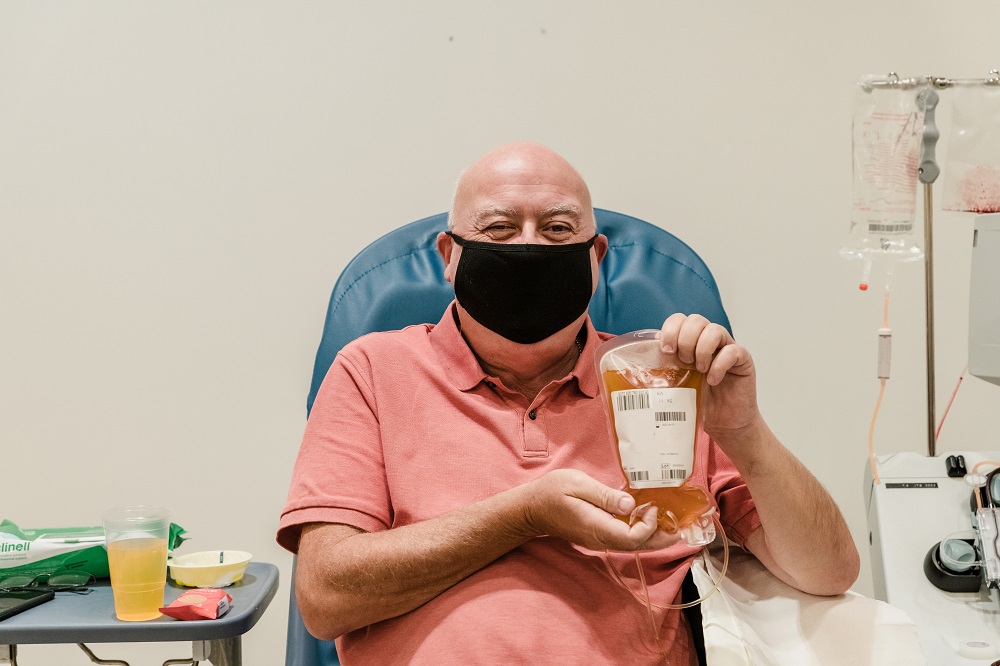Why Donating Plasma Makes a Difference
Donating plasma is a selfless act that can make a significant difference in the lives of others. Plasma is a vital component of blood and plays a crucial role in various medical treatments. By donating plasma in West Valley City, you can directly contribute to saving lives and improving the health of individuals in need.
The Impact of Plasma Donations
Plasma donations are used in the treatment of a wide range of medical conditions, including immune deficiencies, bleeding disorders, and certain neurological disorders. Plasma contains proteins and antibodies that help fight infections and maintain bodily functions. Individuals who have undergone trauma, organ transplants, or major surgeries often require plasma transfusions to aid in their recovery.
Moreover, certain chronic illnesses, such as hemophilia, rely on plasma-derived medications to prevent complications and manage symptoms. By donating plasma, you are supporting the production of these life-saving treatments and providing relief to individuals living with these conditions.
The Importance of Regular Donations
While a single plasma donation can certainly make a difference, regular donations have an even greater impact on patient care. Plasma donations are in constant demand, and the need for plasma-derived medications is ever-present.
By committing to regular donations, you are ensuring a steady supply of plasma for hospitals and medical institutions. This consistency is crucial, especially for individuals who rely on plasma transfusions as a part of their ongoing treatment or management of chronic conditions.
How Plasma Donations Help Medical Research
Aside from its use in direct patient care, donated plasma also plays a vital role in medical research. Plasma contains a wealth of information about the body’s immune response, proteins, and potential disease markers.
Researchers can use plasma samples to study various conditions, develop new diagnostic tools, and explore potential treatments. By donating plasma, you are contributing to the advancement of medical knowledge and potentially aiding in the development of breakthrough therapies.
The Donation Process: A Step-by-Step Guide
Preparing for Your Plasma Donation
Before heading to the donation center, there are a few steps you can take to ensure a successful donation experience. It is important to maintain a healthy lifestyle by eating a nutritious meal, staying well-hydrated, and getting plenty of rest the night before your donation.
It is advisable to avoid fatty or greasy foods as they can affect the quality of your plasma. Additionally, certain medications may interfere with the donation process, so it is essential to inform the donation center staff about any prescription or over-the-counter medications you are currently taking.
What to Expect During the Plasma Donation Process
Upon arrival at the donation center, you will be asked to complete a questionnaire regarding your medical history and lifestyle habits. This information is vital to ensure the safety of both donors and recipients.
Next, a staff member will conduct a physical examination, including checking your vital signs and verifying your eligibility to donate. This may include a brief fingerstick test to measure your hemoglobin levels.
Once you are deemed eligible, the donation process will begin. A needle will be inserted into a vein in your arm, and blood will be drawn. The collected blood will then be processed to separate the plasma from other components. The remaining components, such as red blood cells and platelets, are returned to your body.
The process typically takes around 60-90 minutes, and you can relax, read, or watch a movie during this time. The staff will ensure your comfort and answer any questions or concerns you may have throughout the process.
After Your Plasma Donation: Tips for Recovery
After your donation, it is essential to take care of yourself to ensure a smooth recovery. The staff will provide you with post-donation instructions, which may include drinking plenty of fluids, avoiding heavy lifting or strenuous exercise, and refraining from smoking or consuming alcohol for a certain period of time.
It is common to experience mild fatigue or dizziness after a plasma donation, but these symptoms typically subside within a few hours. Should you experience any prolonged or severe side effects, it is important to contact the donation center or seek medical attention.
Where to Donate Plasma in West Valley City
Finding a Reputable Plasma Donation Center
When it comes to plasma donation, it is crucial to choose a reputable donation center that prioritizes donor safety and follows strict protocols for plasma collection and processing. One way to ensure a center’s credibility is to look for certification from the AABB (formerly known as the American Association of Blood Banks).
You can also ask for recommendations from healthcare professionals or individuals who have previously donated plasma. Online reviews and ratings can provide valuable insights into the quality of service provided by different centers.
What to Look for in a Plasma Donation Center
While finding a reputable center is important, it is also necessary to consider other factors that contribute to a positive donation experience. Look for centers that prioritize donor comfort, with well-trained staff who communicate effectively and address any concerns you may have.
The location and hours of operation are also important considerations. Choose a center that is conveniently located and has operating hours that align with your schedule. This will make it easier for you to commit to regular donation appointments.
Maximizing Your Plasma Donation Experience
The Benefits of Becoming a Regular Plasma Donor
Becoming a regular plasma donor not only allows you to make a more significant impact but also offers several benefits for your own health. Regular donations can help maintain healthy iron levels in the body, reduce the risk of cardiovascular disease, and promote the production of new red blood cells.
Furthermore, many plasma donation centers provide incentives or compensation for donors. These may include gift cards, cash rewards, or loyalty programs that allow you to earn points redeemable for merchandise or services.
Tips for a Successful and Comfortable Plasma Donation
To ensure a successful and comfortable plasma donation experience, here are some tips and strategies you can follow:
- Stay hydrated: Drinking plenty of fluids before and after donation helps maintain a healthy blood volume and can make the donation process smoother.
- Eat a balanced meal: Consuming a nutritious meal before your donation can prevent lightheadedness and low blood sugar levels during the procedure.
- Dress appropriately: Opt for loose-fitting clothes with sleeves that can be easily rolled up, allowing easy access to your arm for the donation process.
- Bring forms of identification: Most donation centers require identification documents, such as a driver’s license or passport, so remember to bring them along.
How to Encourage Others to Donate Plasma
You can play an active role in raising awareness about the importance of plasma donation by sharing your own positive experiences and knowledge with others. Utilize social media platforms, community forums, or local events to spread the word and educate others.
Additionally, consider organizing or participating in plasma donation drives or volunteering at local donation centers. By leading by example and actively engaging with others, you can inspire and encourage more individuals to donate plasma and make a difference in the lives of those in need.
Donating plasma is a noble act that has a direct and lasting impact on countless individuals. By understanding the importance of plasma donations, familiarizing yourself with the donation process, and choosing a reputable donation center, you are taking significant steps towards making a meaningful difference in the lives of others. Embrace the opportunity to give back to your community and join the ranks of plasma donors in West Valley City.
FAQ
Question: Can donating plasma save lives? – Yes, donating plasma can save lives as it is used in the treatment of various medical conditions and is crucial for individuals who require plasma transfusions to aid in their recovery.
Question: What are the benefits of regular plasma donations? – Regular donations have a greater impact on patient care and ensure a steady supply of plasma for hospitals and medical institutions. Additionally, regular donations can help maintain healthy iron levels, reduce the risk of cardiovascular disease, and promote the production of new red blood cells.
Question: How does donated plasma help in medical research? – Donated plasma plays a vital role in medical research as it contains valuable information about the body’s immune response, proteins, and disease markers. Plasma samples can be used to study various conditions, develop new diagnostic tools, and explore potential treatments.
Question: What should I expect during the plasma donation process? – During the plasma donation process, you will be asked to complete a questionnaire regarding your medical history and lifestyle habits. A staff member will also conduct a physical examination. Once deemed eligible, a needle will be inserted into a vein in your arm to draw blood. The collected blood will then be processed to separate the plasma from other components.
Question: How should I take care of myself after donating plasma? – After donating plasma, it is essential to follow post-donation instructions provided by the staff. This may include drinking plenty of fluids, avoiding heavy lifting or strenuous exercise, and refraining from smoking or consuming alcohol for a certain period of time.
Question: How can I find a reputable plasma donation center? – To find a reputable plasma donation center, look for certification from the AABB (formerly known as the American Association of Blood Banks). You can also ask for recommendations from healthcare professionals or individuals who have donated plasma, and check online reviews and ratings.
Question: What factors should I consider when choosing a plasma donation center? – When choosing a plasma donation center, it is important to consider factors such as donor comfort, well-trained staff, location, and hours of operation. Choose a center that prioritizes donor safety and aligns with your schedule.
Question: How can I encourage others to donate plasma? – You can encourage others to donate plasma by sharing your positive experiences and knowledge on social media platforms, community forums, or local events. Consider organizing or participating in plasma donation drives and volunteering at local donation centers to inspire and educate others.







